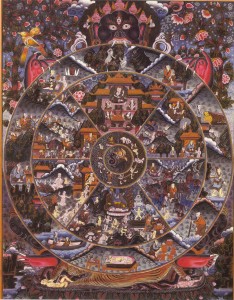The following is respectfully quoted from “The Way of the Bodhisattva” by Shantideva:
 27.
27.
That which is referred to as the Primordial Substance,
That which has been labeled as the Self
Do not come into being thinking
“That is how I will arise.”
28.
That which is not manifest is not yet there,
So what could want to come to be?
And permanently drawn toward its object,
It can never cease from being so.
29.
Indeed! This Self if permanent,
Is certainly impassible like space itself.
And should it meet with other factors,
How should they affect it since it is unchanging?
30.
If, when things occur, it stays unchanged and as as before,
What influence has action had on it?
They say that this affects the Self,
But what connection could there be between them.
31.
All things, then, depend on something else;
On this depends the fact that none are independent.
Knowing this, we will not be annoyed at objects
That resemble magical appearances.
32.
“Resistance,” you may say, “is out of place,
For what will be opposed by whom?”
The stream of suffering is cut through by patience;
There’s nothing inappropriate in wanting that!
33.
Thus, when enemies or friends
Are seen to act improperly,
Be calm and call to mind
That everything arises from conditions.
34.
If things occurred to living beings
Following their wishes and intentions,
How could sorrow ever come to them–
For there is no one who desires to suffer!
35.
Yet carelessly, all unaware,
They tear themselves on thorns and briars;
And ardent in pursuit of wives and goods,
They starve themselves of nourishment.
36.
Some hang themselves up or leap into the void,
Or eat bad food or swallow deadly poison,
Or by their evil conduct
Bring destruction on themselves.
37.
For when affliction seizes them,
They kill themselves, the selves they love so much.
So how could they not be the cause
Of pain and suffering for others?
38.
And when, as victims of defilement,
Beings even cause their own destruction,
Even if compassion does not rise in us,
We can at least refrain from being angry.
39.
If those who are like wanton children
Are by nature prone to injure others,
What point is there in being angry–
Like resenting fire for its heat?
40.
And if their faults are fleeting and contingent,
If living beings are by nature wholesome,
It’s likewise senseless to resent them–
As well be angry at the sky for having clouds!
41.
Although indeed it is the stick that hurts me,
I am angry at the one who wields it, striking me.
But he is driven and impelled by anger–
So it is his wrath I should resent.
42.
I it was who in the past
Did harm to beings such as these.
And so, when others do me mischief,
It is only just that they should injure me.
43.
Their weapons and my body–
Both are causes of my suffering!
They their weapons drew, while I held out my body.
Who then is more worthy of my anger?
44.
This human form is like a running sore;
Merely touched, it cannot stand the pain!
I’m the one who clings to it with blind attachment;
Whom should I resent when pain occurs?
45.
We who are like senseless children
Shrink from suffering, but love its causes.
We hurt ourselves; our pain is self-inflicted!
Why should others be the object of our anger?










